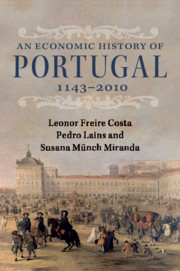Book contents
- Frontmatter
- Contents
- List of figures
- List of maps
- List of tables
- Preface
- Introduction
- 1 The medieval economy, 1143–1500
- 2 The age of globalization, 1500–1620
- 3 War and recovery, 1620–1703
- 4 The Atlantic economy, 1703–1807
- 5 The rise of liberalism, 1807–1914
- 6 Patterns of convergence, 1914–2010
- Conclusion
- References
- Index
1 - The medieval economy, 1143–1500
Published online by Cambridge University Press: 05 May 2016
- Frontmatter
- Contents
- List of figures
- List of maps
- List of tables
- Preface
- Introduction
- 1 The medieval economy, 1143–1500
- 2 The age of globalization, 1500–1620
- 3 War and recovery, 1620–1703
- 4 The Atlantic economy, 1703–1807
- 5 The rise of liberalism, 1807–1914
- 6 Patterns of convergence, 1914–2010
- Conclusion
- References
- Index
Summary
Portugal became an independent kingdom in the twelfth century, and just over one hundred years later had established the borders it still has today. Portugal's nationhood was determined not by geography, linguistic issues, or any preexisting political structure. The kingdom's emergence as a distinct entity in the Iberian Peninsula was pivoted on a series of political and military events seeking the reclamation of land occupied by Muslims after their invasion in Iberia in 711–716. The Reconquista of the al-Andalus, as Muslims called their conquests in Iberia, is key to understanding the emergence of Portugal as a state. It brought back into Christianity lands that were among the most prosperous in Medieval Europe. At the end of the tenth century, stretching from the river Douro to Gibraltar, al-Andalus had an abundant and diversified agricultural produce, which also enjoyed the reputation of being the most technically sophisticated of the time. Of an estimated population of 10 million, 10 percent lived in cities. It was the western-most part of the Islamic world, which was described at the time as being a series of urban centers, connected by trade routes, lubricated by precious metals, and closely linked to the sub-Saharan empires of Ghana, Mali, and Songhai (Findlay and O'Rourke 2007: 48–59). The al-Andalus “represented a kind of El Dorado or Promised Land” whose resources provided a powerful incentive to the Christian kingdoms of the northern Iberian Peninsula (Chalmeta 1994: 756). Muslim Portugal was part of “Gharb al-Andalus,” the western al-Andalus, and evidence suggests that it was notably from the lower valley of the Tagus to the south that Muslim occupation was more dense and urbanized.
The making of a political entity through conquest of land and capture of resources from the western al-Andalus determined the balance of power among the Crown, the nobility, and the Church, which were the three prominent institutions called to organize new settlements and the exploitation of endowments. The partition of wealth among these entities fostered warfare, not only within the borders, but also, and mainly, beyond frontiers. Thereby the main stages of the Reconquista that pushed the frontiers further to the south and the capture of Ceuta in 1415 that opened up the European expansion are events having common ultimate factors, namely the king's need of legitimizing his rule by redistributing resources and jurisdictional powers that were pegged to the exploitation of land.
- Type
- Chapter
- Information
- An Economic History of Portugal, 1143–2010 , pp. 14 - 51Publisher: Cambridge University PressPrint publication year: 2016



